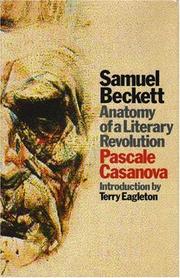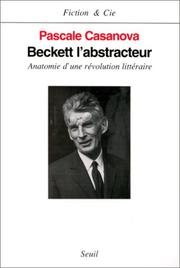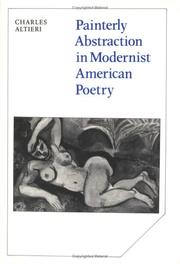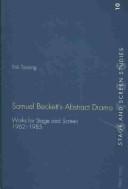| Listing 1 - 6 of 6 |
Sort by
|
Book
ISBN: 9781474461658 Year: 2023 Publisher: Edinburgh Edinburgh University Press
Abstract | Keywords | Export | Availability | Bookmark
 Loading...
Loading...Choose an application
- Reference Manager
- EndNote
- RefWorks (Direct export to RefWorks)
Explores abstraction as a keyword in aesthetic modernism and in critical thinking since MarxAbstraction as the 'missing keyword' in Raymond WilliamsThe writing of abstraction in Marx and MarxismPaul Cézanne and Barnett Newman compared as writer-artists of abstraction New readings of abstraction and the inhuman in the experimental writing of Gertrude Stein, Wallace Stevens and Samuel BeckettA close study of Beckett's 'Proustian equation' and its role in a transformed thinking of abstractionAbstraction is one of the most important words in modernism and in the critical thought of modernity, yet its complex work is invariably hidden in plain sight. What do we want from abstraction? Does it refer to thought, or to art? Is it a term of reproach, or of affirmation? Beyond these distinctions, Jeff Wallace's new intellectual history of abstraction in modernism and modernity proposes that abstraction is always uniquely concerned with the importance and revaluation of the inhuman in and for the human. Wallace's case studies range across the writings of Raymond Williams and Paul Valéry, Marx and Marxist aesthetics, the discourse on abstract visual art in Cézanne, Kandinsky, Mondrian and Newman, the literary experimentalisms of Gertrude Stein, Wallace Stevens and Samuel Beckett, and the twenty-first-century legacies of modernist abstraction in two forms: the post-Deleuzian resurgence of interest in the philosophies of William James, Henri Bergson and A. N. Whitehead; and the act of looking at the abstract canvas in plays by Yasmina Reza, John Logan and Lee Hall. Contrary to habitual associations of abstraction's difficulty with the exclusivity of high modernism, Wallace finds an inclusive and democratic impulse at the heart of the difficulty itself - the promise of an abstraction for all.
Abstraction --- Modernism (Aesthetics) --- Abstraction in literature --- Art, Abstract

ISBN: 9781844671120 1844671127 Year: 2006 Publisher: London Verso
Abstract | Keywords | Export | Availability | Bookmark
 Loading...
Loading...Choose an application
- Reference Manager
- EndNote
- RefWorks (Direct export to RefWorks)
Beckett, Samuel --- Abstraction in literature. --- Avant-garde (Aesthetics) --- Beckett, Samuel, --- Criticism and interpretation.
Book
ISBN: 9780521190862 9780511761003 9780511789519 0511789513 052119086X 0511761007 0511848579 110720397X 1282723553 9786612723551 0511788789 0511786913 0511785771 0511788053 Year: 2010 Publisher: Cambridge New York Cambridge University Press
Abstract | Keywords | Export | Availability | Bookmark
 Loading...
Loading...Choose an application
- Reference Manager
- EndNote
- RefWorks (Direct export to RefWorks)
Edward Ragg's study was the first to examine the role of abstraction throughout the work of Wallace Stevens. By tracing the poet's interest in abstraction from Harmonium through to his later works, Ragg argues that Stevens only fully appreciated and refined this interest within his later career. Ragg's detailed close-readings highlight the poet's absorption of late nineteenth century and early twentieth century painting, as well as the examples of philosophers and other poets' work. Wallace Stevens and the Aesthetics of Abstraction will appeal to those studying Stevens as well as anyone interested in the relations between poetry and painting. This valuable study embraces revealing philosophical and artistic perspectives, analyzing Stevens' place within and resistance to Modernist debates concerning literature, painting, representation and 'the imagination'.
Stevens, Wallace --- Abstractie in de literatuur --- Abstraction dans la littérature --- Abstraction in literature --- Art et littérature --- Kunst en literatuur --- Peinture et littérature --- Schilderkunst en literatuur --- Abstraction in literature. --- Art and literature. --- Stevens, Wallace, --- Art and literature --- Literature and art --- Literature and painting --- Literature and sculpture --- Painting and literature --- Sculpture and literature --- Aesthetics --- Literature --- Aesthetics. --- Arts and Humanities

ISBN: 2020305410 9782020305419 Year: 1997 Publisher: Paris : Seuil,
Abstract | Keywords | Export | Availability | Bookmark
 Loading...
Loading...Choose an application
- Reference Manager
- EndNote
- RefWorks (Direct export to RefWorks)
Et si Beckett n'avait dû sa consécration qu'à un malentendu si insistant que seule une révolution de sa lecture pouvait restituer la révolution qu'il a accomplie. Il arrive en effet que l'interprétation obligée et autorisée d'un travail littéraire, relayée par les dévots de la mystique poétique, occulte l'immensité d'une oeuvre et en inverse le sens. Beckett a introduit en littérature une subversion aussi radicale que celle de Duchamp en art : il a inventé l'art littéraire abstrait. Entreprise si attentatoire aux credos de la " profondeur " qu'on n'a su appliquer à son oeuvre que l'idée la plus rebattue de la poésie qu'il avait passé sa vie à refuser : " Ah, les vieilles questions, les vieilles réponses, il n'y a que ça! " ironisait-il. Au terme d'une enquête qui réintroduit l'histoire ( Joyce, Yeats, la littérature et l'Irlande ...) au sein de cette oeuvre réputée la Plus " pure ", voici le portrait inédit de l'artiste en " abstracteur ", inventeur des règles spécifiques de l'abstraction littéraire ; et un démontage de sa combinatoire logique qui donne la clé des énigmes les plus obscures du Dépeupleur ou de Cap au pire. Comme dit Beckett : " Encore. Dire encore. Soit dit encore. Tant mal que pis encore. Jusqu'à plus mèche encore. Soit dit plus mèche encore." (quatrième de couverture)
Beckett, Samuel --- Beckett, Samuel, --- Criticism and interpretation --- Critique et interprétation --- Avant-garde (Aesthetics) --- Abstraction in literature. --- Analyse de l'art --- Critique litteraire --- Littérature --- Théâtre --- 20e siècle --- Criticism and interpretation. --- Abstraction in literature --- -Avant-garde (Aesthetics) --- -Aesthetics --- Modernism (Art) --- -Criticism and interpretation --- -Beckett, Samuel --- Critique et interprétation --- Aesthetics --- Pei-kʻo-tʻe, Sa-miao-erh, --- Beḳeṭ, Samuel, --- Beckett, Sam, --- Беккет, Сэмюэль, --- בעקעט, סאמועל --- בקט, סמואל --- בקט, סמואל, --- بكت، ساموئل --- Bikit, Sāmūʼil, --- Avant-garde (Aesthetics) - Ireland. --- Avant-garde (Aesthetics) - France.

ISBN: 0521330858 9780521330855 Year: 1989 Publisher: Cambridge Cambridge University Press
Abstract | Keywords | Export | Availability | Bookmark
 Loading...
Loading...Choose an application
- Reference Manager
- EndNote
- RefWorks (Direct export to RefWorks)
"Charles Altieri's book sets modernist American poetry in a precise cultural context by analysing how major poets reacted to the challenge posed by modernist painting's radical critique of traditional representational models for art. It argues that modernist poets have tended to resist the received values of their contemporary culture by finding idealising principles in modes of pure abstraction. It traces the use of such abstraction in literature from Wordsworth, through Baudelaire and Mallarme, to T.S. Eliot, William Carlos Williams, Marianne Moore, and Gertrude Stein. There are summary chapters also on Wallace Stevens and Ezra Pound, considerations of Cezanne and the Cubists, and a substantial theoretical discussion of the nature of abstract art."--Publisher description.
Poetry --- American literature --- anno 1900-1999 --- Abstractie in de literatuur --- Abstraction dans la littérature --- Abstraction in literature --- Ik in de literatuur --- Moi dans la littérature --- Self in literature --- American poetry --- Modernism (Literature) --- Poésie américaine --- Modernisme (Littérature) --- History and criticism --- Histoire et critique --- Abstraction in literature. --- Art and literature --- Self in literature. --- History and criticism. --- History --- Soi dans la littérature --- Zelf in de literatuur --- Abstraction dans la littérature --- Poésie américaine --- Modernisme (Littérature) --- Moi dans la littérature --- 20th century --- United States --- Eliot, Thomas Stearns --- Criticism and interpretation --- Pound, Ezra Loomis --- Stevens, Wallace --- Williams, William Carlos --- Moore, Marianne --- Stein, Gertrude

ISSN: 16602560 ISBN: 9783039110223 3039110225 Year: 2007 Volume: 10 Publisher: Oxford : Peter Lang,
Abstract | Keywords | Export | Availability | Bookmark
 Loading...
Loading...Choose an application
- Reference Manager
- EndNote
- RefWorks (Direct export to RefWorks)
Beckett, Samuel --- Drama --- Abstraction in literature --- Influence (Literary, artistic, etc.) --- Technique --- Beckett, Samuel, --- Schoenberg, Arnold, --- Kandinsky, Wassily, --- Literary style --- Criticism, Textual --- Influence --- Drama - Technique --- Beckett, Samuel, - 1906-1989 - Technique --- Beckett, Samuel, - 1906-1989 - Literary style --- Beckett, Samuel, - 1906-1989 - Criticism, Textual --- Schoenberg, Arnold, - 1874-1951 - Influence --- Kandinsky, Wassily, - 1866-1944 - Influence --- BECKETT (SAMUEL), 1906-1989 --- CRITIQUE ET INTERPRETATION --- Beckett, Samuel, - 1906-1989 --- Schoenberg, Arnold, - 1874-1951 --- Kandinsky, Wassily, - 1866-1944
| Listing 1 - 6 of 6 |
Sort by
|

 Search
Search Feedback
Feedback About UniCat
About UniCat  Help
Help News
News